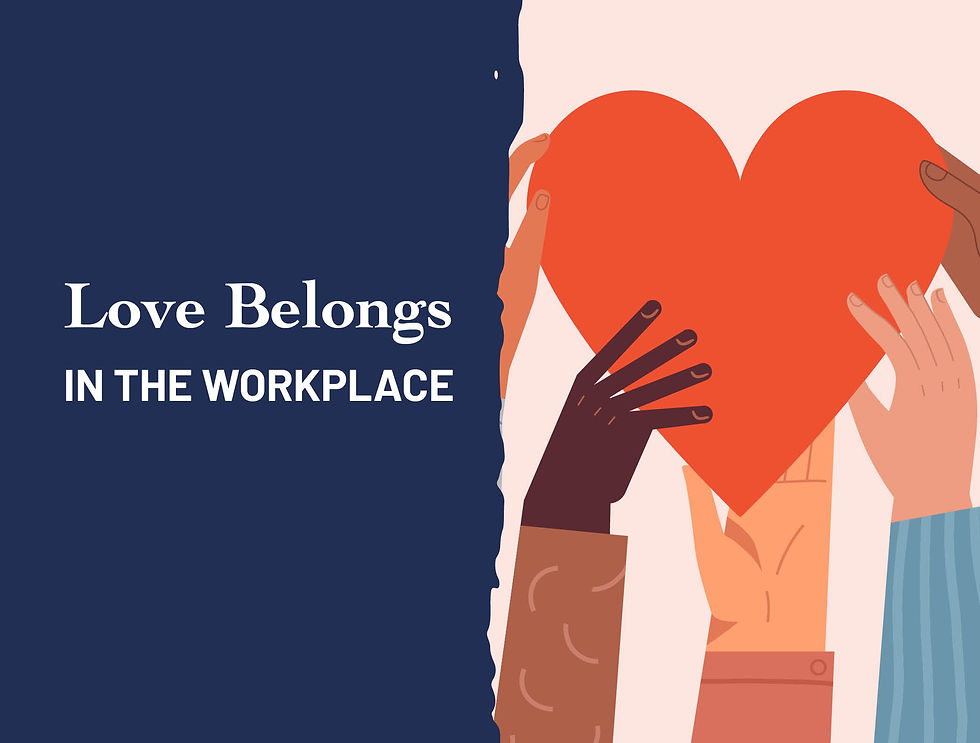When we love each other at work, we honor human dignity, meet basic human needs, and unlock the full potential of individuals and teams.

In her book Love 2.0, Barbara Fredrickson redefines love not as a romantic endeavor but as a micro-moment of shared positivity between individuals. She describes love as a vital human emotion that fosters connection, care, and mutual upliftment. When applied to workplace culture, this definition of love can transform organizations into environments where employees thrive, experience dignity, and contribute meaningfully to their collective success.
The Power of Love in Workplace Culture & Human Dignity and Basic Needs
When love is an integral part of workplace culture, we naturally prioritize human dignity. Workplace Peace Institute provides a framework for understanding and honoring basic human needs in professional settings. These needs include but are not limited to:
Safety: Psychological and emotional security within the workplace.
Connection: The ability to form meaningful relationships with colleagues.
Purpose: Having meaningful work that aligns with personal and organizational values.
Autonomy: The freedom to contribute ideas and take ownership of tasks.
Fairness: Equitable treatment, recognition, and respect for all employees.
By leading with love, organizations intentionally ensure these needs are met, fostering a workplace where individuals feel valued and supported.
Love and Intelligence: Emotional, Dignity, and Cultural
When we embrace the power of love in workplace culture, we are intentional about leading with three key forms of intelligence:
Emotional Intelligence (EI): The ability to recognize, understand, and manage one’s own emotions while empathetically navigating relationships with others.
Dignity Intelligence (DI): The capacity to acknowledge, uphold, and protect the inherent worth of every individual in the workplace.
Cultural Intelligence (CI): The skill of recognizing and respecting diverse cultural perspectives, ensuring inclusivity and equitable opportunities for all.
These forms of intelligence create an environment where love manifests through mutual respect, deep listening, and an ongoing commitment to inclusivity and fairness.
The Impact of Love on Workplace Success
When employees feel loved and valued, they gain a greater capacity for creativity, innovation, collaboration, and problem-solving. Love fosters psychological safety—an essential ingredient for high-performing teams. Employees who experience love in the workplace are more likely to:
Engage deeply in their work with a sense of ownership and enthusiasm.
Think creatively and propose innovative solutions without fear of rejection.
Collaborate effectively with colleagues, leveraging collective intelligence for better outcomes.
Solve problems with resilience and adaptability, knowing they are supported by their teams.
Love and Workplace Productivity
A workplace culture infused with love leads to higher employee engagement and productivity. When employees feel psychologically safe, cared for, and connected to one another, they are more:
Motivated: Love creates a sense of belonging, which increases commitment to shared goals.
Resilient: Employees can navigate challenges with the confidence that they are supported.
Efficient: Collaboration and open communication reduce inefficiencies and conflicts.
Loyal: Organizations that prioritize love and dignity experience lower turnover and higher employee retention rates.
Cultivating Love in the Workplace
To integrate love into workplace culture, organizations can take intentional steps such as:
Encouraging Open Communication: Create spaces where employees feel safe to express their thoughts, concerns, and ideas. Offering compassionate communication training will empower leaders and employees with the skills to communicate with empathy and honesty through a power conscious lens.
Recognizing and Celebrating Contributions: Show appreciation for employees’ efforts and achievements. Leaders often need upskilling in how to deliver fair, consistent, and effective feedback that supports teams in feeling valued while supporting their professional growth.
Fostering Inclusive Leadership: Train leaders to practice emotional, dignity, and cultural intelligence.
Prioritizing Employee Well-being: Support mental health initiatives such as behavioral health coaching and trauma support services as well as work-life balance programs.
Building Collaborative Spaces: Design work environments that encourage teamwork and meaningful connections.
Love in the workplace is not a sentimental ideal but a practical approach to building a thriving, engaged, and productive workforce. By embedding love into workplace culture, organizations create an environment where people feel safe, valued, and inspired. In turn, this fosters creativity, innovation, collaboration, and problem-solving, ensuring long-term success for both employees and the organization as a whole.
When we love each other at work, we honor human dignity, meet basic human needs, and unlock the full potential of individuals and teams. Love is not just good for the heart—it’s good for business.
Workplace Peace Institute is an organization systems design and research firm that is singularly focused on creating workplace cultures where people thrive. Workplace Peace Institute supports small to mid-sized businesses in optimizing employee engagement, maximizing organizational productivity, and improving profitability by infusing human security and dignity as foundational attributes of their business model. Our Leadership Academy supports leaders in honoring basic human needs and dignity needs in the workplace, so they can actualize human potential in the workplace. The online Leadership Academy optimizes competencies in human behavior, communication skills, conflict resolution, and Diversity, Equity, Inclusion and Belonging to create highly engaged workplaces where basic human needs and dignity are consistently honored. All our courses are offered online and can be customized for in-person workshops and seminars.
Comments